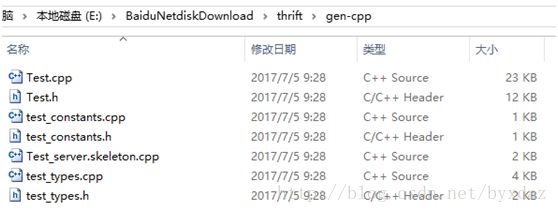Thrift之c++实例
一、c++实例
1.下载与安装thrift工具
http://thrift.apache.org/download/
http://archive.apache.org/dist/thrift/
2.编写Thrift文件(定义接口,结构,异常等),保存为test.thrift
struct User{
1:i64 id,
2:string name,
3:i32 age,
4:bool vip
}
service Test{
i32 add(1:i32 a,2:i32 b)
User getById(1:i64 id)
}
3.生成接口代码
把thrift-0.9.3.exe和test.thrift文件放在同一个目录。
进入DOS命令执行:thrift-0.9.3.exe -r --gen cpp test.thrift
--gen后指定生成的语言,生成的cpp存储在目录gen-cpp下。
生成文件gen-cpp/Test.h、Test.cpp等,如下图。
Test_server.skeleton.cpp,就是C++服务端的main函数入口文件,里面使用了TSimpleServer作为TCP服务,性能较低,但是实现简单,比较合适做进程管理类的接口。
4、服务端代码
1)、新建vc工程。
2)、将上面的文件拷贝到工程目录下,Test_server.skeleton.cpp,就是C++服务端的main函数入口文件。
// This autogenerated skeleton file illustrates how to build a server.
// You should copy it to another filename to avoid overwriting it.
#include "Test.h"
#include
#include
#include
#include
using namespace ::apache::thrift;
using namespace ::apache::thrift::protocol;
using namespace ::apache::thrift::transport;
using namespace ::apache::thrift::server;
using boost::shared_ptr;
class TestHandler : virtual public TestIf {
public:
TestHandler() {
// Your initialization goes here
Init();
}
int32_t add(const int32_t a, const int32_t b) {
// Your implementation goes here
printf("add\n");
return a+b;
}
void getById(User& _return, const int64_t id) {
// Your implementation goes here
User *user;
std::list::iterator iter = m_listUser.begin(),iterEnd = m_listUser.end();
for(iter; iter!=iterEnd; iter++)
{
user = *iter;
if(user->id == id)
{
_return.id = user->id;
_return.__set_name(user->name.c_str());
_return.age = user->age;
_return.__set_vip(user->vip);
break;
}
}
printf("getById\n");
}
protected:
void Init(){
m_listUser.clear();
int n = 0;
for(n=0; n<10; n++){
User * user = new User();
user->id = n+1;
user->age = 18+n;
sprintf((char *)user->name.data(),"name_%d",n+1);
//插入
m_listUser.push_back(user);
}
}
std::list m_listUser;
};
int main(int argc, char **argv) {
int port = 9090;
shared_ptr handler(new TestHandler());
shared_ptr processor(new TestProcessor(handler));
shared_ptr serverTransport(new TServerSocket(port));
shared_ptr transportFactory(new TBufferedTransportFactory());
shared_ptr protocolFactory(new TBinaryProtocolFactory());
TSimpleServer server(processor, serverTransport, transportFactory, protocolFactory);
server.serve();
return 0;
}
//需要引入thrift对于cpp的lib头文件所在目录,openssl头文件所在目录,boost头文件所在目录。
//需要引用lib文件,LibThrift.lib libeay32MT.libssleay32MT.lib
thrift对于cpp的lib文件所在目录,比如:
e:\libthrift\libthrift-0.9.3\lib\cpp\src\thrift\windows
e:\libthrift\libthrift-0.9.3\lib\cpp\src
//如果用到thrift的异步通讯方式,需要libevent库支持,lib库文件libevent.lib libevent_core.lib libevent_extras.lib。
用VS2008的nmake编译(libevent)C语言代码的方法
1)用vcvars32.bat设置环境变量或直接通过Visual Studio 2008 命令提示进入vc环境
D:\Program Files (x86)\Microsoft Visual Studio 9.0\VC\bin>vcvars32.bat
D:\Program Files (x86)\Microsoft Visual Studio 9.0\VC\bin>"D:\Program Files (x86
)\Microsoft Visual Studio 9.0\Common7\Tools\vsvars32.bat"
Setting environment for using Microsoft Visual Studio 2008 x86 tools.
2)切换到源代码所在的目录
D:\Program Files (x86)\Microsoft Visual Studio 9.0\VC\bin>cd E:\libevent-2.0.21-stable-vs2008
对源代码需要做些修改。
添加宏定义
在libevent-2.0.21-stable文件夹下找到下面三个文件:
event_iocp.c
evthread_win32.c
listener.c
打开并在开头加上宏定义:
#define _WIN32_WINNT 0x0500
因为event_iocp.c里用到
#if (_WIN32_WINNT >= 0x0403)
WINBASEAPI
BOOL WINAPI
InitializeCriticalSectionAndSpinCount(
__out LPCRITICAL_SECTION lpCriticalSection,
__in DWORD dwSpinCount
);
WINBASEAPI
DWORD
WINAPI
SetCriticalSectionSpinCount(
__inout LPCRITICAL_SECTION lpCriticalSection,
__in DWORD dwSpinCount
);
#endif
所以要定义_WIN32_WINNT这个宏,而且值要大于0x0403。
如果没有这个宏或不满足条件,编译器会假定这个函数没有定义,
等到链接时再寻找它,这样这个函数的符号就假定返回一个int,
而显示标准库文件里这个函数不是返回int,所以在链接时就会找不到这个函数符号。
注意:宏一定要定义在#include
3)用nmake.exe编译
E:\libevent-2.0.21-stable-vs2008>nmake /f Makefile.nmake
libevent在windows下使用步骤详解
参考http://www.mamicode.com/info-detail-504940.html
5、客户端代码
1)、新建vc工程。
2)、将上面的文件(除Test_server.skeleton.cpp外)拷贝到工程目录下。
3)、编写客户端代码。
// Client.cpp : 定义控制台应用程序的入口点。
//
#include "stdafx.h"
#include
#include
#include
#include
#include "Test.h"
using namespace apache::thrift;
using namespace apache::thrift::protocol;
using namespace apache::thrift::transport;
using boost::shared_ptr;
using namespace std;
int main(int argc, char* argv[])
{
boost::shared_ptr socket(new TSocket("localhost", 9090));
//对接nonblockingServer时必须的,对普通server端时用boost::shared_ptr transport(new TBufferedTransport(socket));
//boost::shared_ptr transport(new TFramedTransport(socket));
boost::shared_ptr transport(new TBufferedTransport(socket));
boost::shared_ptr protocol(new TBinaryProtocol(transport));
TestClient client(protocol);
try
{
//设置发送、接收、连接超时
socket->setConnTimeout(5000);
socket->setRecvTimeout(5000);
socket->setSendTimeout(5000);
transport->open();
//insert your code here
int nResult = client.add(100,200);
printf("add(%d,%d) = %d\n",100,200,nResult);
User findUser;
findUser.id = -100;
client.getById(findUser,1);
printf("%s\n",findUser.name.c_str());
transport->close();
printf("send success!\n");
}
catch (...)
{
}
return 0;
}
//需要引入thrift对于cpp的lib头文件所在目录,openssl头文件所在目录。
//需要引用lib文件,LibThrift.lib libeay32MT.libssleay32MT.lib
二、VS2008上编译thrift的库文件
1、下载thrift-0.9.3.tar.gz源码,源码针对cpp的编译自带的是vs2010版本。
2、需要第三方库boost、libevent、openssl支持。
libevent-2.0.21-stable.tar.gzhttps://github.com/downloads/libevent/libevent/libevent-2.0.21-stable.tar.gz
boost 1.54.0
http://www.boost.org/users/history/version_1_54_0.html
编译好的boost 1.54.0下载地址:https://sourceforge.net/projects/boost/files/boost-binaries/1.54.0
OpenSSL 1.0.0g
VC2008下使用OpenSSL 1.0.0g(免编译)
http://blog.csdn.net/akof1314/article/details/7241829
3、新建vc工程,编译。
用Project From Existing Code...创建工程。
将 cpp/src/thrift加入工程,修改项目配置类型修改成静态库。
在Solution Explorer中,
去除 qt目录。
添加 boost包含目录、openssl所包含目录。
添加 src为包含目录,不然 #include
VC2008缺少 stdint.h,创建到thrift/windows目录下,并添加为include目录。
下图为程序目录结构
#include
typedef boost::int8_t int8_t;
typedef boost::uint8_t uint8_t;
typedef boost::int16_t int16_t;
typedef boost::uint16_t uint16_t;
typedef boost::int32_t int32_t;
typedef boost::uint32_t uint32_t;
typedef boost::int64_t int64_t;
typedef boost::uint64_t uint64_t;
#define INT8_MIN ((int8_t)_I8_MIN)
#define INT8_MAX _I8_MAX
#define INT16_MIN ((int16_t)_I16_MIN)
#define INT16_MAX _I16_MAX
#define INT32_MIN ((int32_t)_I32_MIN)
#define INT32_MAX _I32_MAX
#define INT64_MIN ((int64_t)_I64_MIN)
#define INT64_MAX _I64_MAX
#define UINT8_MAX _UI8_MAX
#define UINT16_MAX _UI16_MAX
#define UINT32_MAX _UI32_MAX
#define UINT64_MAX _UI64_MAX
去除VC2010 thrift.sln中没有的文件,无法编译:
Mutex.cpp, PosixThreadFactory.cpp, Monitor.cpp
TEvhttpClientChannel.cpp TEvhttpServer.cpp
TServer.cpp TNonblockingServer.cpp
TSSLSocket.cpp TSSLServerSocket.cpp
TZlibTransport.cpp
加上宏 HAVE_CONFIG_H,或者 force include force_inc.h.
windows/tr1/functional中
#include
改为
#include
三、vc2015编译thrift-0.10.0
1、thrift-0.10.0包含libthrift和libthriftnb两个工程
libthrift:阻塞thrift rpc
libthriftnb:非阻塞thrift rpc,需要使用libevent库。
编译时,上面只需要openssl库的头文件路径。但在引用thrift库文件时,需要加载openssl库的头文件路径和lib文件路径。
2、编译过程:
1)、将openssl1.0.1c库文件夹拷贝到与thrift同级目录下。
2)、将libevent-2.0.21-stable库文件夹拷贝到与thrift同级目录下。libevent的版本需要与libthrift中帮助文档中指定的版本一致。
3)、修改thrift--lib--cpp中3rdparty.props文件中,修改boost、libevent、openssl宏。
4)、打开libthrift.sln,编译。
注意:在编译静态库时,需要添加TServerFramework、TConnectedClient文件到工程中,否则不会导出这两个类,在引用thrift文件时,会报找不到函数的链接错误。
3rdparty.props文件
F:\develop\boost_1_66_0
F:\develop\openssl1.0.1c
F:\develop\libevent-2.0.21-stable
$(BOOST_ROOT)
true
$(OPENSSL_ROOT_DIR)
true
$(LIBEVENT_ROOT)
true
三个开源库定义宏里面的内容值,根据所在电脑的路径进行修改。修改完成之后重新打开解决方案。
代码下载
四、libthrift阻塞模式中的服务器,线程中处理服务器代码,以便有空闲时间处理其他业务。
#include "stdafx.h"
// This autogenerated skeleton file illustrates how to build a server.
// You should copy it to another filename to avoid overwriting it.
#include "Test.h"
#include
#include
#include
#include
#include
#include
#include
using namespace ::apache::thrift;
using namespace ::apache::thrift::protocol;
using namespace ::apache::thrift::transport;
using namespace ::apache::thrift::server;
using namespace ::apache::thrift::concurrency;
class TestHandler : virtual public TestIf {
public:
TestHandler() {
// Your initialization goes here
Init();
}
int32_t add(const int32_t a, const int32_t b) {
// Your implementation goes here
printf("add\n");
return a + b;
}
void getById(User& _return, const int64_t id) {
// Your implementation goes here
User *user;
std::list::iterator iter = m_listUser.begin(), iterEnd = m_listUser.end();
for (iter; iter != iterEnd; iter++)
{
user = *iter;
if (user->id == id)
{
_return.id = user->id;
_return.__set_name(user->name.c_str());
_return.age = user->age;
_return.__set_vip(user->vip);
break;
}
}
printf("getById\n");
}
protected:
void Init() {
m_listUser.clear();
int n = 0;
for (n = 0; n < 10; n++) {
User * user = new User();
user->id = n + 1;
user->age = 18 + n;
sprintf((char *)user->name.data(), "name_%d", n + 1);
//插入
m_listUser.push_back(user);
}
}
std::list m_listUser;
};
class TStartObserver : public apache::thrift::server::TServerEventHandler {
public:
TStartObserver() : awake_(false) {}
virtual void preServe() {
apache::thrift::concurrency::Synchronized s(m_);
awake_ = true;
m_.notifyAll();
}
void waitForService() {
apache::thrift::concurrency::Synchronized s(m_);
while (!awake_)
m_.waitForever();
}
private:
apache::thrift::concurrency::Monitor m_;
bool awake_;
};
int main(int argc, char **argv)
{
int nRet = 0;
//start
int port = 9090;
boost::shared_ptr server;
boost::shared_ptr observer;
boost::shared_ptr serverThread;
boost::shared_ptr threadManager = NULL;
boost::shared_ptr serverTransport;
try
{
boost::shared_ptr handler(new TestHandler());
boost::shared_ptr processor(new TestProcessor(handler));
serverTransport.reset(new TServerSocket(port));
boost::shared_ptr transportFactory(new TBufferedTransportFactory());
boost::shared_ptr protocolFactory(new TBinaryProtocolFactory());
threadManager = ThreadManager::newSimpleThreadManager(10);
boost::shared_ptr threadFactory = boost::shared_ptr(new PlatformThreadFactory());
threadManager->threadFactory(threadFactory);
threadManager->start();
server.reset(new TThreadPoolServer(processor, serverTransport, transportFactory, protocolFactory, threadManager));
observer.reset(new TStartObserver());
server->setServerEventHandler(observer);
serverThread.reset();
serverThread = threadFactory->newThread(server);
serverThread->start();
observer->waitForService();
printf("done.\n");
}
catch (const std::exception& ex)
{
printf(ex.what());
nRet = -3;
}
catch (...)
{
nRet = -1;
}
//模拟其他业务处理
while (true)
{
Sleep(200);
}
////////////////////////////////////////////////////////////////////
//stop
if (server != NULL)
{
server->stop();
}
if (serverTransport != NULL)
{
serverTransport->close();
}
if (threadManager != NULL)
{
threadManager->stop();
}
if (serverThread != NULL)
{
serverThread->join();
}
return 0;
}


